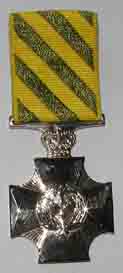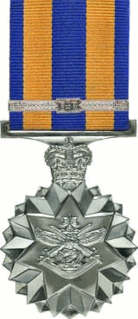 W
WThe 80th Anniversary Armistice Remembrance Medal was a commemorative medal made to commemorate the 80th anniversary of the Armistice marking the end of World War I. Each of the 71 surviving Australian First World War veterans were presented with the medal for Anzac Day 1999. It is the first commemorative medal in the Australian Honours System.
 W
WThe Anniversary of National Service 1951–1972 Medal is a commemorative medal awarded to Australians for their service in post-war national service schemes.
 W
WThe Australian Cadet Forces Service Medal is awarded to recognise long and efficient service by officers and instructors in the Australian Defence Force Cadets. It is awarded for 15 years service. Additional clasps are issued for every 5 years additional service.
 W
WShips and units of the Royal Australian Navy have received numerous battle honours throughout the navy's history.
 W
WThe Colonial Auxiliary Forces Long Service Medal was instituted by Queen Victoria in 1899 as a military long service award for part-time members of all ranks in any of the organized military forces of the British Colonies, Dependencies and Protectorates throughout the British Empire. The medal gradually superseded the Volunteer Long Service Medal for India and the Colonies in all these territories, with the exception of the Isle of Man, Bermuda and the Indian Empire.
 W
WThe Colonial Auxiliary Forces Officers' Decoration, post-nominal letters VD, was established in 1899 as recognition for long and meritorious service as a part-time commissioned officer in any of the organized military forces of the British Colonies, Dependencies and Protectorates. It superseded the Volunteer Officers' Decoration for India and the Colonies in all these territories, but not in the Indian Empire.
 W
WThe Commendation for Gallantry is a military decoration awarded to personnel of the Australian Defence Force, it recognises acts of gallantry in action considered worthy of recognition. The award was introduced on 15 January 1991, replacing the Imperial equivalent of the Mentioned in Despatches. It is ranked fourth in the Gallantry Decorations in the Australian Honours System. Since its inception 68 awards have been made.
 W
WThe Conspicuous Service Cross (CSC) is a decoration (medal) of the Australian honours system. It is awarded to members of the Australian Defence Force "for outstanding devotion to duty or outstanding achievement in the application of exceptional skills, judgment or dedication, in non-warlike situations". In November 2019, 1129 people were listed as recipients. All ranks are eligible for the award.
 W
WThe Defence Force Service Medal (DFSM) is an Australian Military award given for long service by permanent members of the Australian Defence Force. It is part of the suite of defence force service awards introduced in 1982, which also included the Reserve Force Decoration and the Reserve Force Medal. All three medals were replaced in 2002 with a single medal, the Defence Long Service Medal, which is now awarded to all permanent and reserve members irrespective of rank.
 W
WThe Defence Long Service Medal is an Australian military award given for long service by permanent and reserve members of the Australian Defence Force (ADF), irrespective of rank. It was introduced in 1998, and replaced the suite of ADF service awards introduced in 1982, which comprised the Defence Force Service Medal, the Reserve Force Medal and the Reserve Force Decoration.
 W
WThe Humanitarian Overseas Service Medal is an award in the Australian honours system. The award is presented to those who perform humanitarian service in a foreign country, in particular those working in dangerous environments or conditions or during a humanitarian crisis. The award was introduced by letters patent on 16 April 1999, following a review of the Australian honours and awards system beginning in 1995.
 W
WThe Australian Meritorious Service Medal (1903–75) was awarded to warrant officers, non-commissioned officers and other ranks who had completed 22 years meritorious service with Australian Military Forces, and who had previously received the Army Long Service and Good Conduct Medal.
 W
WThe National Medal is an Australian award given for long service by operational members of specified eligible organisations. It was introduced in 1975, as an original component of the new Australian honours system, and replaced a range of medals available to military and civilian uniformed services for long service and good conduct. The eligible groups have in common that their members serve or protect the community at the risk of death, injury or trauma, hence it is only available to members of the eligible organisations who are operationally deployed. In the case of corrective services, eligibility is restricted to officers with custodial duties.
 W
WThe Reserve Force Decoration is an Australian Military award given for long service by officers of the Reserve Forces. It is part of the suite of defence force service awards introduced in 1982, which also included the Defence Force Service Medal and the Reserve Force Medal. However, the RFD is the only one of the three to carry a postnominal entitlement.
 W
WThe Reserve Force Medal (RFM) is an Australian Military award given for long service by non-commissioned members of the Reserve Forces. It is part of the suite of defence force service awards introduced in 1982, which also included the Defence Force Service Medal and the Reserve Force Decoration. All three medals were replaced in 2002 with a single medal, the Defence Long Service Medal, which is now awarded to all permanent and reserve members irrespective of rank.
 W
WThe Volunteer Long Service Medal was instituted in 1894 as an award for long service by other ranks and some officers of the United Kingdom's Volunteer Force. In 1896, the grant of the medal was extended to other ranks and officers who had served in the ranks of the Volunteer Forces throughout the British Empire. A separate new medal was instituted, the Volunteer Long Service Medal for India and the Colonies. Awarding of this medal was discontinued in stages when it was superseded in most territories by the Colonial Auxiliary Forces Long Service Medal in 1899 and in the remainder by the Efficiency Medal in 1930.
 W
WThe Volunteer Officers' Decoration was instituted in 1892 as an award for long and meritorious service by officers of the United Kingdom's Volunteer Force. In 1894, the grant of the decoration was extended to commissioned officers of Volunteer Forces throughout the British Empire. A separate new decoration was instituted, the Volunteer Officers' Decoration for India and the Colonies, post-nominal letters VD.